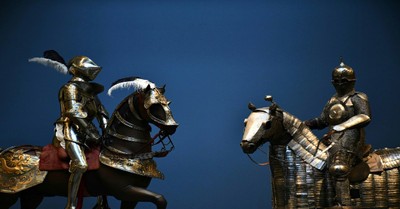Is Chivalry Biblical?
Men


Audio By Carbonatix
By Peyton Garland, Crosswalk.com
What Is Chivalry?
Chivalry originated in medieval Europe in the 10th century. Chevalerie, chivalry’s original French root, means “horse soldiery,” reflecting the skill of a cavalryman. However, King Charlemagne’s European empire sought to mold the term “chivalry,” using the Christian church as a tool to restore the Frankish army, a violent military group composed of Germanic tribes that came to power after the fall of the Western Roman Empire.
Thus, chivalry’s original definition, which related to soldiers or knights, evolved into a man’s personal character as a soldier, primarily defending the weak and practicing the virtues of honor and respect.
Unfortunately, just because the church introduces a cultural concept doesn’t always mean it reflects Christian principles. In fact, if we study some of Charlemagne’s forced conversions, we will discover that his use of chivalry was not ethical or something Christians should applaud. Therefore, these culturally muddied waters leave us with the foundational question: Is chivalry biblical?
What Does the Bible Say about Honor and Respect?
Given that the Bible, both Old and New Testaments, was written long before the 10th century, we know the term “chivalry” can’t be found in Scripture. However, the chivalrous principles Charlemagne introduced, like virtue and uprightness, are certainly highlighted in the Bible, most notably through the terms “honor” and “respect.”
Consider these notable verses that not only highlight but also define the terms:
In relation to God —
- “…that all may honor the Son just as they honor the Father. Whoever does not honor the Son does not honor the Father, who sent him.” John 5:23
- “Whoever serves me must follow me; and where I am, my servant also will be. My Father will honor the one who serves me.” John 12:26
- “In a loud voice they were saying: ‘Worthy is the Lamb, who was slain, to receive power and wealth and wisdom and strength and honor and glory and praise!’” Revelation 5:12
In relation to others —
- “Be devoted to one another in love. Honor one another above yourselves.” Romans 12:10
- “Children, obey your parents in the Lord, for this is right. ‘Honor your father and mother’—which is the first commandment with a promise—‘so that it may go well with you and that you may enjoy long life on the earth.’” Ephesians 6:1-3
- “Marriage should be honored by all, and the marriage bed kept pure, for God will judge the adulterer and all the sexually immoral.” Hebrews 13:4
In relation to the government —
- “Let everyone be subject to the governing authorities, for there is no authority except that which God has established. The authorities that exist have been established by God.” Romans 13:1
- “Give to everyone what you owe them: If you owe taxes, pay taxes; if revenue, then revenue; if respect, then respect; if honor, then honor.” Romans 13:7
- “Show proper respect to everyone, love the family of believers, fear God, honor the emperor.” 1 Peter 2:17
In relation to oneself —
- “Whoever pursues righteousness and love finds life, prosperity and honor.” Proverbs 21:21
- “...you were bought at a price. Therefore honor God with your bodies.” 1 Corinthians 6:20
- “...that each of you should learn to control your own body in a way that is holy and honorable…” 1 Thessalonians 4:4
The resounding theme among these verses is simple but hard to practice. Respect and honor call us to die to ourselves. In relation to God, we must surrender pride and admit that, through God alone, we are saved, redeemed, and preserved. In relation to others, we must realize that our spouse, our parents, our neighbors—everyone, in fact, must be considered before oneself. In relation to government, we must pay our taxes and honor the laws, despite our opinions concerning the ruling authority. In relation to ourselves, we must literally sacrifice our desires each day for the sake of godly pursuit.
So although chivalry isn’t a term mentioned explicitly in Scripture, the chivalrous knight’s code of conduct, including honor and respect, undeniably calls a soldier to place others above himself, and in that way is consistent with biblical principles.
Was Jesus Chivalrous?
I believe it’s always dangerous to fit Jesus inside any man-made box, even if it’s one with righteous, holy intentions. After all, no one and no thing taints righteousness and holiness quite like human beings. However, given Christ’s continual willingness to defend the poor (Matthew 11:4-6, Luke 14:16-24), dignify women (Mark 14:3-6, Luke 8:43-47), and show respect and sacrificial love to everyone (John 3:16, 1 John 4:16), it’s hard to deny that Jesus’ character was not only endearing but gentlemanly in every respect.
Many modern women, feminists included, willingly admit that there is something compelling about a man who is willing to pay for dinner, open the door for her, respect her voice and her body, etc. Hundreds of years following the understanding of chivalry, it’s natural for women to label a man like this chivalrous, and as John Stonestreet points out, this kind of chivalrous behavior is often perceived as sexy. But if a woman were to dig even deeper, beyond the knightly sex appeal, she might notice that the virtues she truly desires aren’t merely chivalrous acts but characteristics of the Son of God who lived among us millennia ago, long before knights and white horses were cultural phenomena.
Is Chivalry Compatible with Christian Virtues?
Within its proper bounds, chivalry is certainly compatible with Christian values. Meanwhile, it’s crucial to understand that a man can’t uphold such consistent honor, respect, and self-sacrifice without the heart of God prompting him, whether he realizes it or not. Sure, someone can use his devotion to a moral country, a moral cause, a moral people, to stir his desire to serve with honor and respect, but chivalry can’t exist apart from the code of conduct God established from the beginning of time.
To remove the Bible’s definition of sacrifice, love, honor, and respect from a chivalrous code of conduct is to upend its righteous foundation that many, even nonbelievers, gravitate towards.
This reminds me of John 3:8, when Christ says to Nicodemus, "The wind blows where it wishes, and you hear its sound, but you do not know where it comes from or where it goes. So it is with everyone who is born of the Spirit.” Jesus is explaining the undeniable movement of His Spirit in all places. People recognize this movement, as one recognizes nature’s undeniable force of the wind, but nonbelievers are trapped in the mystery without awe. They wonder, they even see, but they don’t know what makes the wind move, what makes chivalry so enticing. As with the wind, chivalry prompts awe, wonder, and gravitational pull because God’s Spirit has this unyielding effect on us, filling our hearts with desires we were created to pursue and have fulfilled.
Conclusion: Should Christians Practice Chivalry Today?
We can question the true character of King Charlemagne (as we can question all men and women in governmental positions of power), and we can scream the modern-day cry, “Chivalry is dead!” These pessimistic views undoubtedly dampen a person’s desire to practice chivalry. But in the righteous sense of upholding honor and respect, defending the poor, and elevating women, Christians should be compelled to practice these chivalrous traditions.
Even so, if these sacrificial principles aren’t rooted in a love for God that naturally produces a love for people, even the least of these, these chivalrous attempts will either be short-lived or mean little to nothing in light of eternity.
I encourage Christians, especially Christian men, to pursue chivalry, but pursue chivalry that is rooted in the unshakeable, unquenchable, undefeatable love of Almighty God.
Photo credit: Unsplash/Karthik B K
 Peyton Garland is an author, editor, and boy mama who lives in the beautiful foothills of East Tennessee. Subscribe to her blog Uncured+Okay for more encouragement.
Peyton Garland is an author, editor, and boy mama who lives in the beautiful foothills of East Tennessee. Subscribe to her blog Uncured+Okay for more encouragement.


























